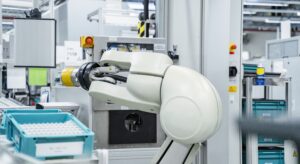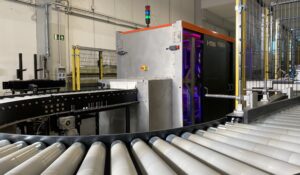In an environment where globalization and digitalization are transforming business operations, logistics has become crucial to the success of all types of businesses.
From e-commerce giants such as Amazon, to distribution companies such as Mercadona, Lidl and BonÀrea, or even large multinational corporations such as Coca-Cola, efficient logistics and proper packaging management are decisive factors. This has a direct impact on product quality, sustainability and the operating costs of each company.
Logistics optimization and sustainability in distribution
Companies such as Mercadona or Amazon, which rely on complex supply chains, have transformed their logistics processes through machine vision technologies and automation systems.
A fundamental aspect of this transformation is packaging management: the correct handling, transport and reuse of pallets, crates and other containers is essential to ensure not only product quality, but also the reduction of waste and environmental impact.
In this context, the use of reusable and recyclable packaging has gone from being an option to become a priority for companies wishing to align themselves with sustainability standards. Distribution giants such as Lidl or BonÀrea have implemented logistics models where pallets and boxes are efficiently reused, reducing waste and optimizing the transport of goods.
Technological innovations in the management of packaging and pallets
Today, recent innovations in machine vision technologies and other automated systems are revolutionizing the way companies manage their packaging.
Especially in sectors such as the food industry, where quality and safety are essential. Many distribution companies have adopted technologies that allow real-time inspection of containers, pallets and crates. These solutions not only detect damage or flaws, but also ensure that products arrive at their destination in the best possible condition and in compliance with specific requirements.
In addition, thanks to the incorporation of the Internet of Things (IoT) and automation in logistics processes, more accurate and efficient control of inventory and packaging has been achieved, improving traceability and reducing downtime.
The role of the circular economy in modern logistics
A key element in the future of logistics is the circular economy, a concept that large companies have begun to integrate into their operations. Several companies have demonstrated that it is possible to reduce costs while increasing efficiency through the use of reusable packaging.
This model not only reduces environmental impact, but also optimizes resource management, aligning logistics operations with global sustainability objectives.
The importance of quality in today’s logistics
It is important to note that, for companies such as Amazon, Coca-Cola or Mercadona, the quality of packaging and pallets is essential to maintain the trust of their customers. The adoption of technological solutions that ensure that these elements are inspected and managed as accurately as possible is a differentiating factor in the market.
An efficient packaging management system not only improves operational efficiency, but also protects the integrity of products during transport, ensuring that they reach the end consumer in perfect condition.
In short, we can say that logistics, driven by technological innovation and a sustainable approach, has become a decisive factor for the success of companies in modern society. From quality control in packaging management to efficiency in distribution systems, logistics plays a crucial role in ensuring customer satisfaction, reducing environmental impact and improving the competitiveness of companies in an increasingly interconnected world.
Machine vision for pallet inspection at i-mas
At i-mas, our engineering department works with machine vision technologies to ensure that each pallet and box meets the strictest food safety requirements. These automated systems allow us to perform accurate inspections in real time, detecting possible damage, contamination or irregularities that could compromise the integrity of products during transportation and storage.
Thanks to this technology, we not only improve traceability and reduce the risk of contamination, but also optimize the rotation of pallets and crates, ensuring that food reaches the final consumer in the best possible condition.
Want to learn more about our services? Get in touch with us!



